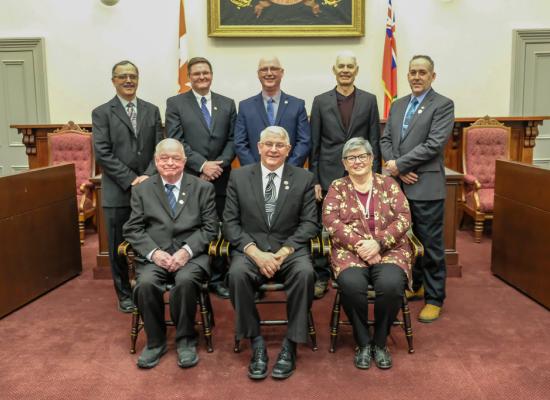
County Council Meets with Ministers of Health and Education at AMO Conference
At the annual Association of Municipalities of Ontario (AMO) Conference held in Ottawa this week, Lennox and Addington County Council had meetings with Ontario’s Minister of Health and Minister of Education.
The meeting with the Honourable Stephen Lecce, Minister of Education was regarding the imposition of Education Development Charges (EDC’s) by local school boards. County Council has serious concerns about the rural inequities of EDC’s, the use and implementation of EDC’s in general and the total lack of consultation about EDC’s by school boards with municipalities. Lennox and Addington County is very rural in nature with our students travel in various different directions feeding into many different schools. This results in rural areas being subjected to multiple Education Development Charges for a variety of different schools that make up the patchwork of their school service area.
Past Warden Marg Isbester explained to Minister Lecce, that “this stacking of EDC’s would cause a substantial financial burden on rural areas of Lennox and Addington County that have students attending multiple different school areas.” Isbester went on to ask the Minister to apply a “Rural Lens” to the issue of EDC’s to ensure that reasonable travel distances and multiple school catchment areas are taken into consideration to prevent the stacking of EDC’s in rural areas. Minister Lecce committed to review Education Development Charges with a rural lens to ensure that there are not unintended consequences for rural areas.
In their meeting with the Honourable Sylvia Jones, Minister of Health, County Council requested confirmation on whether or not her Ministry is proceeding with the regionalization of paramedic services. The Emergency Health Services Modernization Project, which called for this regionalization, was announced at the 2019 AMO Conference. The Ministry hosted consultations, and invited stakeholder feedback to the Discussion Paper: Emergency Health Services Modernization. Understandably, in early 2020, this initiative was placed on hold due to COVID-19 pandemic.
Past Warden Isbester explained to the Minister that many paramedic services, Lennox and Addington County included, have delayed the implementation of service enhancements and key staffing decisions due to the uncertainty of the future of the service. Isbester went on to say, “We have not received any communication since early 2020 and our service enhancements remain on hold.” Minister Jones then confirmed that regionalization of paramedic services is not on her radar for the foreseeable future.
County Council also asked the Minister to recognize that Offload Delays are a risk to public safety, and requested that her Ministry dedicate resources to effectively address this issue. Ambulance offload delays occur when paramedics must wait in an emergency department for a patient to be transferred to the care of the hospital. These delays are tying up paramedics for longer and longer, preventing them from responding to calls during that time. This depletes resources and leads to slower response time to patients in the community, who may experience an avoidable deterioration in their heath outcome. Minister Jones expressed concern and committed to seek solutions for off-load delays that impact our paramedic services.
Lennox and Addington County Council also participated in a joint meeting with Frontenac County with the Parliamentary Assistant to the Minister of Health Robin Martin. The topic of this meeting was governance of recently formed Ontario Health Teams, in particular the Frontenac-Lennox and Addington Ontario Health Team (FLAOHT).
Since the announcement of OHTs, Lennox and Addington and Frontenac County Councils have been advocating to ensure proper governance is in place at the OHT and to secure individual seats for each County at the governance table. This effort has been ongoing for two years.
Together Frontenac and Lennox and Addington tax and spend over $233M per year on services to residents, which are healthcare or directly related to social determinants of health: Long-Term Care, paramedics, public health, safe injection sites, first responder, housing and homelessness, social services, water/wastewater/septic, public safety, recreation and many more. Municipal Councillors are elected to represent their taxpayers and oversee the use of taxpayer funds for these healthcare services. The two County Wardens explained, “It is essential for municipal representatives to have a governance role in the FLAOHT.”
Both County Council’s believe that property taxpayers deserve to have their voice at the OHT table and simply request that the Province implement a consistent approach to municipal participation in OHTs and that a governance model be mandated to include a position for locally elected County representatives on the leadership of their OHT.
